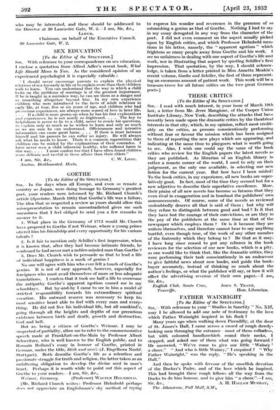GOETHE
[To the Editor of the SPECTATOR.] Sun,—In the days when all Europe, and even so remote a country as Japan, were doing honiage to Germany's greatest poet, your readers were informed by Mr. Richard Church's article (Spectator, March 19th) that Goethe's life was a failure. The idea that so respected a review as yours should allow this misrepresentation to remain uncontradicted gives me such uneasiness that I feel obliged to send you a few remarks in
answer to it. . .
1. What place in the Germany of 1775 would Mr. Church have proposed to Goethe if not Weimar, where a young prince offered him his friendship and every opportufiity for his various talents ?
2. Is it fair to mention only Schiller's first impression, when it is known that, after they had become intimate friends, lie confessed lie had never met a nobler-minded man than Goethe ? • 3. Does Mr. Church wish to persuade us that to lead a life of individual happiness is a mark of genius ?
No one will agree with him who ever felt a touch of Goethe's genius. It is not of easy approach, however, especially for foreigners who must avail themselves of more or less adequate translations. I confess that it took me half a life to overcome the antipathy Goethe's apparent egotism caused me in my schooldays. But by-and-hy I came to see in him a model of strictest responsibility towards his extraordinary spiritual vocation. His outward reserve was necessary to keep his most sensitive heart able to feel with every man and every- thing. He did not live his individual life, but all mankind's, going through all the heights and depths of our precarious existence between birth and death, growth and destruction, God and hell.
But as, being a citizen of Goethc's Weimar, I may be suspected of partiality, allow me to refer to the commemorative speech made at Frankfurt-on-the-Main by Professor Albert Schweitzer, who is well known to the English public, and to Remain Rolland's essay in honour of Goethe, printed in German, under the title, Stirb and teepee (J. Engelhorn Nadir. Stuttgart). Both describe Goethe's life as a relentless and passionate struggle for truth and religion, the latter taken as an unfaltering obligation- to develop the divine seed in man's heart. Perhaps it is worthwhile to point out this aspect of
Goethe to your readers.—I am, Sir, &e., •
Weimar, Germany. (Professor) WALTER HF.LMBOLD. • Richard ChUrch writes : Professor Helmbold •p6rhaps does not appreciate an Eaglislmmtes 'shy method of trying to express his wonder and reverence in the presence of so astonishing a genius as that of Goethe. Nothihg I had to say in my essay derogated in any way from the character of the poet. I did not even comment on the aspect usually picked upon by English critics, and which Professor Helmbold men- tions in his letter, namely, the " apparent egotism" which frightens so ninny people away from Goethe and his work; I sec no unfairness in dealing with one aspect of Goethe's life and work, nor in illustrating that aspect by quoting Schiller's first impression. That quotation, by the way, I should acknow- ledge, is taken from a letter printed in Miss Annette Meakin's recent volume, Goethe and Schiller, the first of three represent- ing an enormous amount of patient work. This work will be a treasure-trove for all future critics on the two great German poets.]






































 Previous page
Previous page